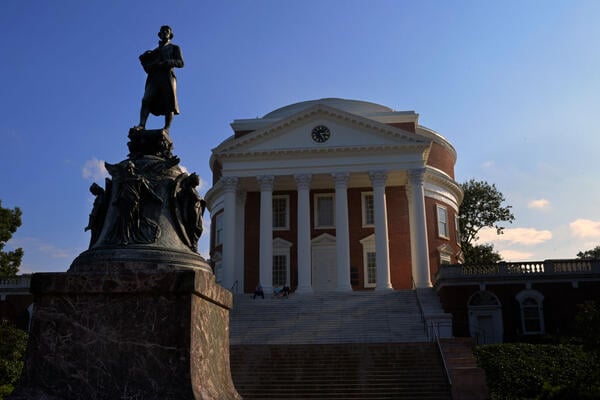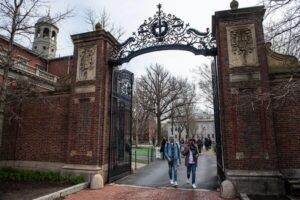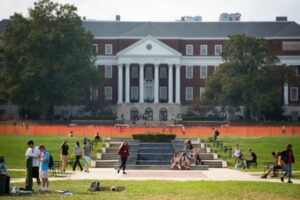
What Did the University of Virginia Agree To?
In agreeing to follow sweeping guidance from the Department of Justice earlier this week, the University of Virginia committed to eliminating all DEI programming and adhering to the Trump administration’s broad interpretation of the Supreme Court’s 2023 decision banning race-conscious admissions policies.
The nine-page DOJ memo, released in July, also bans the participation of transgender athletes in sports and the use of “ostensibly neutral proxies” for race, like geographic location. It came just three months after a federal court struck down a similar directive from the Department of Education and was viewed by many policy experts as even more wide-reaching and restrictive. The guidance hasn’t yet faced a legal challenge.
Attorney General Pam Bondi originally wrote in the memo that the provisions outlined were a list of “non-binding suggestions” designed to “minimize the risk of [legal] violations.” But now, at least for UVA, it has become obligatory “so long as that guidance remains in force and to the extent consistent with relevant judicial decisions.” Failure to comply could risk the university’s federal funding.
Under the agreement, the DOJ says it will temporarily pause all pending civil rights investigations, but if at any point Trump officials determine the flagship institution is making “insufficient progress toward compliance,” the DOJ reserves the right to resume investigation, pursue enforcement actions or terminate federal funding. In the meantime, UVA will be required to provide “relevant information and data” to the agency on a quarterly basis through 2028.
“So if [UVA] feels confident that they can comply, then this could be a good outcome for the school. The investigations are closed and they don’t admit liability,” said Scott Goldschmidt, a partner and civil rights specialist at the law firm Thompson Coburn LLP. “But if there is any issue, or the government sees otherwise, then all bets are off, and they could be in a worse position than when they signed the agreement.”
In Goldschmidt’s view, it’s all a part of the DOJ’s effort to encourage colleges to accept “their interpretation of law” without facing a legal challenge.
“It was nonbinding,” he said of the guidance, “which is, again, why it’s so interesting that UVA seemed to pre-emptively comply with this over the summer and now has turned it into mandatory guidance by this agreement.”
Starting in April, the DOJ used a series of letters to accuse UVA officials of actively attempting to “defy and evade federal anti-discrimination laws.” By early June, experts say, the assistant attorney general pressured former UVA president James Ryan to resign. Still, in the wake of the Justice Department’s pressure campaign, the institution’s interim president, Paul Mahoney, rejected the Trump administration’s even more sweeping “Compact for Academic Excellence in Higher Education” last week.
UVA is just the latest institution to cut a deal with the Trump administration, though unlike those previous agreements, the public university won’t have to pay anything. This is also the first agreement to be made that deals primarily with the Justice Department’s guidance and diversity, equity and inclusion rather than alleged mishandling of antisemitism on campus.
As other colleges and universities face related investigations, this deal could become a new framework for the administration and how it negotiates to bring higher education to heel.
So, here’s a look at three key aspects of the agreement.
1. Ending What Trump Calls Segregation and Preferential Treatment
The July directive set four core standards for the universities and provided a broad but nonexhaustive list of examples for each.
First, the DOJ requires the university to eliminate any practices in admissions, hiring or programming that Trump deems “preferential treatment” based on race, sex, religion or “other protected characteristics.” This could include identity-based scholarships, affinity groups or support programs; hiring or promotion practices that prioritize one specific group over another; or designating certain spaces on campus for students of a particular identity.
Then, officials added in the memo that the use of purportedly neutral characteristics, like geographic location and cultural competency, are also prohibited as they can be used as “substitutes” for protected characteristics and are therefore “unlawful proxies.”
The department cited essay prompts that suggest applicants write about “overcoming obstacles” as an example, despite the fact that the Supreme Court explicitly said in its ruling on affirmative action that college applicants could still write about their experiences with racism, sexism or religious discrimination so long as universities did not use them to re-establish “the regime we hold unlawful today.”
The memo also lists segregation and training that officials say promotes discrimination as violations of civil rights law, citing as examples race-based training sessions like “Black caucuses” and “white ally meetings” and measures for selecting contracts that prioritize female-owned businesses.
But what UVA is required to do under the guidance could change depending on court decisions.
2. Not Infringing Academic Freedom
In the text of the agreement and various materials distributed by UVA, university officials appear to intentionally reinforce that these restrictions on admissions, hiring and extracurricular programing will not impede the university’s right to academic freedom.
“The U.S. does not aim to dictate the content of academic speech or curricula, and no provision of this agreement, individually or taken together, shall be construed as giving the United States the authority to dictate the content of academic speech or curricula,” the sixth point of the agreement reads.
Mahoney’s statement to the UVA committee, as well as a frequently asked questions page on the UVA website, emphasized similar points, saying that no “external monitor” would be involved and that UVA will address any compliance concerns raised by the DOJ independently.
“Importantly, [the agreement] preserves the academic freedom of our faculty, students, and staff,” Mahoney wrote. “We will also redouble our commitment to … free expression, and the unyielding pursuit of ‘truth, wherever it may lead,’ as Thomas Jefferson put it.”
This differs from the more recent Compact for Academic Excellence in Higher Education, which would require an institution to restrict employees from expressing political views on behalf of the institution and shut down departments that “punish, belittle” or “spark violence against conservative ideas.”
3. Pausing Liability but Keeping the University Vulnerable
The second line of the agreement makes it clear that the document is not “an admission, in whole or in part” and that UVA “expressly denies liability with respect to the subject matter of the investigations.”
So, as long as UVA complies with the DOJ memo, the investigations will be closed and the university will no longer be at risk of having to pay a multimillion-dollar settlement fee or losing federal financial aid. But Goldschmidt from Thompson Coburn emphasized that such a scenario is “a big if.”
“If the DOJ at any point finds that UVA did not comply, then everything gets reopened, and all the potential issues, penalties, etc. that could come from a federal civil rights investigation would fall back down on the institution,” he explained.
And given that the DOJ’s memo is “the most aggressive document that we’ve seen reinterpreting Title VI civil rights laws,” Goldschmidt said, the risk is even greater. So while UVA has already made its decision, he suggested that other universities think it through before they do the same.
“Schools would really want to think hard and deep about whether there is any wiggle room,” he said, “because the consequences of violating the DOJ’s memo are so strong.”
Source link



